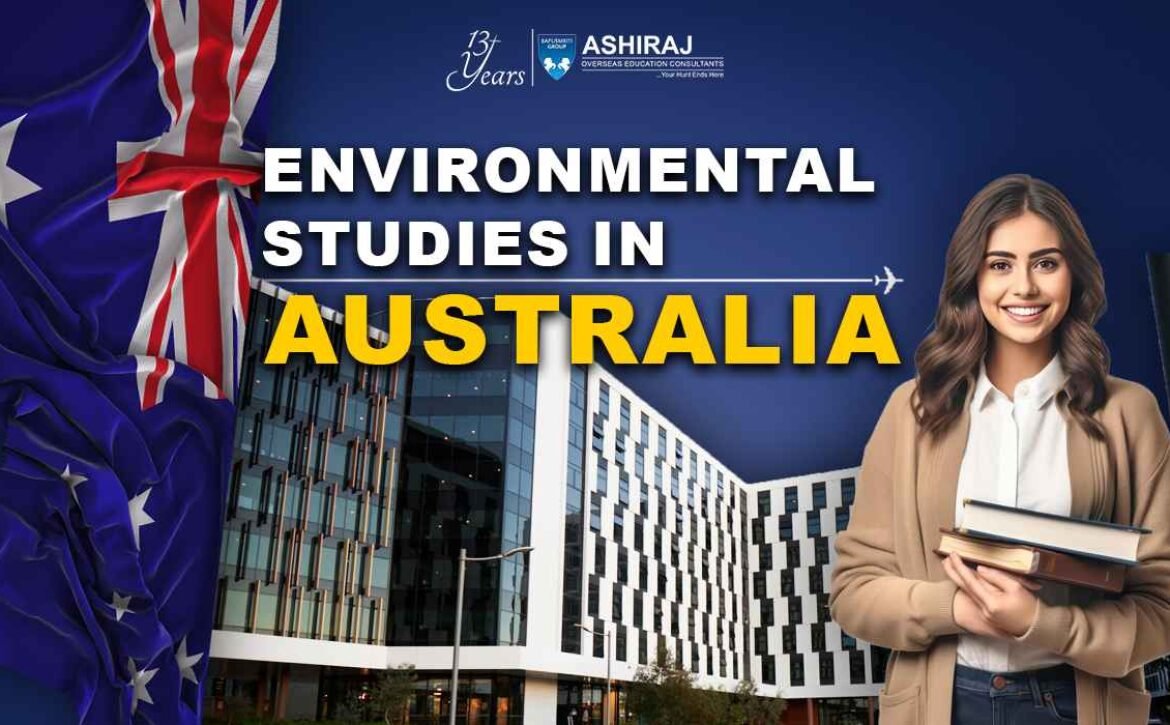
Environmental Studies in Australia
Environmental studies in Australia encompass a diverse and critical examination of the country’s unique ecosystems, environmental policies, and sustainability initiatives. Australia, renowned for its vast landscapes ranging from tropical rainforests to arid deserts, offers a rich tapestry for environmental study and research. This field explores the interplay between natural environments and human activities, addressing pressing issues such as climate change, biodiversity conservation, water management, and urban sustainability. Environmental studies in Australia are characterized by interdisciplinary approaches that integrate scientific research with social, economic, and political perspectives, aiming to foster sustainable development practices and mitigate environmental impacts.
Australia’s commitment to environmental stewardship is evident in its progressive policies and initiatives aimed at preserving its natural heritage and promoting environmental sustainability. From the Great Barrier Reef, a UNESCO World Heritage site facing challenges from climate change and pollution, to initiatives promoting renewable energy and wildlife conservation, Australia serves as a compelling case study in environmental resilience and conservation efforts. Environmental studies in Australia thus play a pivotal role in shaping global environmental discourse and policy frameworks, offering insights into effective strategies for mitigating environmental degradation and adapting to changing environmental conditions.
Why to Study Environmental Studies in Australia?
- Diverse Ecosystems:
Australia is home to a wide range of ecosystems, from coral reefs to deserts, offering a unique and comprehensive field study experience.
- World-Class Universities:
Australia boasts top-ranking universities with strong environmental science programs and research facilities.
- Global Environmental Challenges:
Studying environmental studies in Australia provides insight into global issues like climate change, water scarcity, and biodiversity loss, with practical examples.
- Field Research Opportunities:
Australia’s diverse landscapes offer extensive opportunities for fieldwork, enhancing practical learning and research skills.
- Innovative Sustainability Practices:
The country is a leader in renewable energy and sustainable practices, providing a cutting-edge learning environment.
- Indigenous Knowledge Integration:
Programs often integrate indigenous knowledge systems, offering a unique perspective on environmental stewardship and sustainability.
- Strong Environmental Policies:
Australia’s progressive environmental policies and conservation efforts serve as valuable case studies for students.
- Career Opportunities:
Graduates have strong prospects in government, NGOs, and private sectors, both within Australia and globally.
- International Collaboration:
Australian institutions collaborate with global organizations, offering students opportunities for international projects and networking.
- Quality of Life:
Studying in Australia offers a high quality of life, with vibrant cities and rich natural beauty enhancing the overall educational experience.
Environmental Studies in Australia provide a holistic and dynamic education, preparing students to address critical environmental challenges globally.
Top Universities to Study Environmental Studies in Australia
Rank | University Name | QS World University Rankings 2023 | Type of University | Average Annual Fees (AUD) | Programs Offered |
1 | University of Melbourne | 33 | Public | $45,000 | Bachelor of Environments, Master of Environment, PhD in Environmental Science |
2 | Australian National University (ANU) | 30 | Public | $42,000 | Bachelor of Environmental Studies, Master of Climate Change, PhD in Environment & Society |
3 | University of Queensland (UQ) | 50 | Public | $40,000 | Bachelor of Environmental Science, Master of Conservation Biology, PhD in Environmental Management |
4 | University of Sydney | 41 | Public | $46,000 | Bachelor of Environmental Systems, Master of Environmental Science, PhD in Environmental Science |
5 | University of New South Wales (UNSW) | 45 | Public | $44,000 | Bachelor of Environmental Management, Master of Environmental Sustainability, PhD in Environmental Studies |
Environmental Studies in Australia provide students with access to some of the world’s best educational institutions. Each university listed offers a range of programs designed to equip students with the knowledge and skills needed to tackle environmental challenges. The average annual fees vary but typically range from $40,000 to AUD 46,000. These universities are known for their strong emphasis on research, interdisciplinary approaches, and commitment to sustainability. By studying Environmental Studies in Australia, students benefit from high-quality education, diverse ecosystems for field research, and a vibrant academic community.
Course Curriculum for Environmental Studies in Australia
- Foundation Courses:
Introduction to Environmental Science: Basics of ecology, biodiversity, and environmental processes.
Environmental Chemistry: Study of chemical processes and their impact on the environment.
Earth Systems: Understanding the physical processes shaping the Earth.
- Core Modules:
Ecology and Conservation: Study of ecosystems, species interactions, and conservation strategies.
Climate Change Science: Examination of climate systems, global warming, and mitigation techniques.
Environmental Policy and Management: Overview of environmental laws, policies, and sustainable management practices.
- Specialized Courses:
Marine and Coastal Ecology: Focus on marine environments, coastal processes, and conservation.
Water Resource Management: Study of hydrology, water quality, and sustainable water use.
Environmental Impact Assessment: Techniques for assessing and mitigating environmental impacts of projects.
- Practical Components:
Fieldwork: Hands-on experience in diverse Australian environments, including rainforests, reefs, and deserts.
Laboratory Work: Practical skills in environmental testing, analysis, and data interpretation.
Internships: Opportunities to work with government agencies, NGOs, and private sector firms.
- Research and Thesis:
Research Projects: Conducting independent research on contemporary environmental issues.
Thesis Writing: Developing a comprehensive thesis based on field and laboratory research.
- Interdisciplinary Approaches:
Integration of social sciences, economics, and policy studies with environmental science.
- Elective Courses:
Wide range of electives allowing students to tailor their studies to specific interests.
Environmental Studies in Australia offer a comprehensive and dynamic curriculum designed to equip students with the necessary skills and knowledge to address environmental challenges globally.
Eligibility Criteria & Admission Requirements for MS in Environmental Studies in Australia
- Academic Qualifications:
A recognized undergraduate degree in environmental science or a related field is typically required.
Relevant coursework in biology, chemistry, and earth sciences can be advantageous.
- English Language Proficiency:
Non-native English speakers must demonstrate proficiency through standardized tests such as IELTS or TOEFL.
- Standardized Test Scores:
Some programs may require GRE or GMAT scores, especially for postgraduate studies.
- Passport & Student Visa:
A valid passport is essential.
Students must apply for and obtain a student visa (subclass 500) to study in Australia.
- Academic Certificates:
Submission of transcripts and academic certificates from previous institutions is mandatory.
- Work Experience:
Relevant work experience in environmental science or related fields can strengthen the application.
- Letters of Recommendation:
Typically, two to three letters of recommendation from academic or professional references are required.
- Statement of Purpose:
A detailed statement outlining the applicant’s interest in environmental studies, career goals, and reasons for choosing to study in Australia.
- Additional Requirements:
Some universities may require an interview or additional documentation.
Test Score Requirements
Test | Minimum Score |
IELTS | 6.5 overall (with no band less than 6.0) |
TOEFL | 79 (iBT) |
GRE | 300 (combined Verbal and Quantitative) |
GMAT | 550 |
Environmental Studies in Australia require a combination of academic credentials, test scores, and relevant experience to ensure applicants are well-prepared for rigorous environmental programs.
Documents Required for Studying Environmental Studies in Australia
- Passport:
A valid passport with a minimum of six months validity from the intended date of entry into Australia.
- Academic Certificates:
Official high school transcripts and certificates for undergraduate applications.
Bachelor’s degree transcripts and certificates for postgraduate applications.
- English Language Proficiency:
IELTS or TOEFL score reports demonstrating proficiency in English.
- Letters of Recommendation (LOR):
Typically, two letters of recommendation from academic or professional references.
- Statement of Purpose (SOP):
A detailed statement outlining your interest in environmental studies, career goals, and reasons for choosing Australia.
- Curriculum Vitae (CV):
A comprehensive CV highlighting your academic background, work experience, and relevant skills.
- Work Experience Certificate:
Proof of any relevant work experience in environmental science or related fields.
- Proof of Financial Resources:
Documentation demonstrating your ability to finance your studies and living expenses in Australia.
- Student Visa Application:
Completion of the student visa (subclass 500) application, including payment of the visa fee.
Summary
To apply for Environmental Studies in Australia, students need to prepare a comprehensive set of documents. This includes a valid passport, academic certificates, English proficiency test scores, two letters of recommendation, a statement of purpose, a CV, work experience certificates, and proof of financial resources. These documents ensure that applicants meet the eligibility requirements and are well-prepared for their studies in Australia.
Admission Process for Environmental Studies in Australia
- Research Programs:
Identify universities in Australia offering Environmental Studies programs.
Review the course curriculum, faculty, research opportunities, and university rankings.
- Check Eligibility Criteria:
Ensure you meet the academic qualifications, English language proficiency, and any specific requirements for the program.
- Prepare Required Documents:
Collect all necessary documents including passport, academic certificates, English proficiency test scores, letters of recommendation, statement of purpose, CV, and proof of financial resources.
- Apply Online:
Complete the online application form available on the university’s official website.
Upload all required documents as specified by the university.
- Pay Application Fee:
Pay the non-refundable application fee as required by the university.
- Submit Application:
Review the application thoroughly and submit it before the deadline.
- Attend Interview (if required):
Some universities may require an interview as part of the admission process.
- Receive Offer Letter:
If accepted, you will receive an offer letter from the university.
- Accept Offer and Pay Deposit:
Accept the offer by paying the deposit as required by the university.
- Apply for Student Visa:
Apply for a student visa (subclass 500) with the offer letter and proof of financial resources.
- Arrange Accommodation:
Arrange for accommodation and prepare for your move to Australia.
The admission process for Environmental Studies in Australia involves researching programs, ensuring eligibility, preparing documents, applying online, and obtaining a student visa. This structured approach helps in securing a place in a reputable Australian university for Environmental Studies.
“Education is the most powerful weapon which you can use to change the world.”
Nelson Mandela
Cost of Environmental Studies Course in Australia
- Tuition Fees:
Undergraduate Programs: Annual tuition fees range from AUD 30,000 to AUD 45,000.
Postgraduate Programs: Annual tuition fees range from AUD 35,000 to AUD 50,000.
- Living Expenses:
Accommodation: Monthly costs range from AUD 1,000 to AUD 2,500 depending on the type and location.
Food and Groceries: Monthly expenses typically range from AUD 300 to AUD 600.
- Health Insurance:
Overseas Student Health Cover (OSHC): Annual cost is around AUD 600 to AUD 800.
- Books and Study Materials:
Average cost per semester: AUD 500 to AUD 1,000.
- Transportation:
Public Transport: Monthly pass ranges from AUD 100 to AUD 200 depending on the city.
Bicycles and Walking: Cost-effective options for getting around campus and nearby areas.
- Miscellaneous Expenses:
Entertainment and Leisure: Monthly expenses range from AUD 200 to AUD 400.
Utilities and Internet: Monthly costs are approximately AUD 150 to AUD 250.
- Student Visa Fee:
Application fee for the student visa (subclass 500): Approximately AUD 630.
- Total Estimated Annual Cost:
Undergraduate Programs: AUD 45,000 to AUD 60,000.
Postgraduate Programs: AUD 50,000 to AUD 65,000.
Studying Environmental Studies in Australia involves a variety of costs including tuition fees, living expenses, health insurance, and more. Being aware of these expenses can help students plan and manage their finances effectively while pursuing Environmental Studies in Australia.
Scholarships for Environmental Studies Courses in Australia
Scholarship Name | Amount (AUD) | Eligibility Criteria | Application Deadline |
Australia Awards Scholarships | Full tuition, living expenses, return airfare | Students from developing countries | April 30 |
University of Melbourne Graduate Research Scholarships | Full tuition, $31,200 annual stipend | High academic achievement, research potential | October 31 |
Endeavour Postgraduate Scholarship Awards | Up to $140,500 | High-achieving international students | November 15 |
University of Sydney International Scholarships | Up to $40,000 | Outstanding academic records | July 15 |
ANU College of Science International Merit Scholarship | $5,000 per year | High academic achievement | November 30 |
Macquarie University Vice-Chancellor’s International Scholarships | Up to $10,000 | Academic merit | December 31 |
Summary
Several scholarships are available for students pursuing Environmental Studies in Australia. These scholarships offer substantial financial support, covering tuition fees, living expenses, and other costs associated with studying in Australia. Here are some notable scholarships:
- Australia Awards Scholarships: Covering full tuition, living expenses, and return airfare for students from developing countries, with an application deadline of April 30.
- University of Melbourne Graduate Research Scholarships: Providing full tuition and an annual stipend of AUD 31,200 for high-achieving students, with applications closing on October 31.
- Endeavour Postgraduate Scholarship Awards: Offering up to AUD 140,500 for high-achieving international students, with a deadline of November 15.
- University of Sydney International Scholarships: Awarding up to AUD 40,000 for outstanding academic records, with applications due by July 15.
- ANU College of Science International Merit Scholarship: Providing AUD 5,000 per year for high academic achievement, with a deadline of November 30.
- Macquarie University Vice-Chancellor’s International Scholarships: Up to AUD 10,000 based on academic merit, with applications due by December 31.
Environmental Studies in Australia can be financially supported through these scholarships, making it accessible to a diverse range of students.
Career Opportunities After Environmental Studies in Australia
Job Profile | Description | Average Salary (AUD) |
Environmental Scientist | Conducts research and assesses environmental data to develop solutions for environmental issues. | $70,000 – $90,000 |
Environmental Consultant | Advises businesses and governments on environmental best practices and compliance with regulations. | $60,000 – $80,000 |
Conservation Scientist | Works to protect natural resources by developing and implementing conservation plans. | $65,000 – $85,000 |
Sustainability Specialist | Develops and implements sustainability strategies for organizations to reduce environmental impact. | $70,000 – $90,000 |
Environmental Engineer | Designs systems and solutions to prevent, control, or remediate environmental hazards. | $75,000 – $95,000 |
Wildlife Biologist | Studies wildlife and their habitats to support conservation and management efforts. | $60,000 – $80,000 |
Climate Change Analyst | Analyzes data related to climate change to inform policy and business strategies. | $70,000 – $90,000 |
Summary
Completing a degree in Environmental Studies in Australia opens up a wide range of career opportunities with competitive salaries. Some prominent job profiles include:
- Environmental Scientist: Engages in research and data assessment to address environmental issues, earning between AUD 70,000 and AUD 90,000 annually.
- Environmental Consultant: Provides expert advice on environmental regulations and best practices to businesses and governments, with salaries ranging from AUD 60,000 to AUD 80,000.
- Conservation Scientist: Develop conservation plans to protect natural resources, with an average salary of AUD 65,000 to AUD 85,000.
- Sustainability Specialist: Implements sustainability strategies to minimize environmental impacts for organizations, earning AUD 70,000 to AUD 90,000.
- Environmental Engineer: Designs and implements solutions for environmental problems, with salaries between AUD 75,000 and AUD 95,000.
- Wildlife Biologist: Studies wildlife to support conservation efforts, with average earnings of AUD 60,000 to AUD 80,000.
- Climate Change Analyst: Analyzes climate data to inform policies and strategies, earning between AUD 70,000 and AUD 90,000.
Environmental Studies in Australia provides graduates with the skills and knowledge to pursue rewarding careers in various fields dedicated to environmental protection and sustainability.
Frequently Asked Questions About Environmental Studies in Australia
Environmental Studies graduates in Australia can pursue careers as environmental scientists, consultants, engineers, sustainability specialists, and more. They work in government agencies, NGOs, private sectors, and research institutions.
Bachelor’s programs typically last 3-4 years, while Master’s programs can range from 1-2 years. PhD programs usually require 3-4 years of full-time study.
Entry requirements vary but generally include academic transcripts, English language proficiency (IELTS/TOEFL), letters of recommendation, and a statement of purpose.
Yes, several scholarships are available, such as the Australia Awards Scholarships, university-specific scholarships, and government-funded grants.
Tuition fees vary, with undergraduate programs ranging from AUD 30,000 to AUD 45,000 per year, and postgraduate programs from AUD 35,000 to AUD 50,000 per year. Living expenses are additional.
Top universities include the University of Melbourne, Australian National University (ANU), University of Queensland (UQ), University of Sydney, and University of New South Wales (UNSW).
Yes, international students on a student visa (subclass 500) can work up to 40 hours per fortnight during study periods and full-time during scheduled breaks.
Australia has robust research infrastructure with state-of-the-art facilities and opportunities for fieldwork in diverse ecosystems, enhancing practical learning.
Specializations may include marine and coastal ecology, climate change science, environmental policy and management, water resource management, and more.
International students need to apply for a student visa (subclass 500) after receiving a Confirmation of Enrollment (CoE) from their chosen Australian institution.




